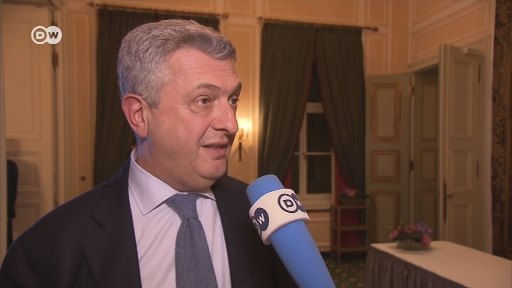UNHCR chief Grandi: Syria needs 'a political settlement'

This browser does not support the video element.
DW: Mr. Grandi, the war in Syria has arguably triggered the most severe refugee crisis in recent history, with millions of Syrians displaced within and outside their country. At the beginning of this month, you returned from a trip to Syria. What is most needed to help the millions of internally displaced people there?
Filippo Grandi: One word: peace. This is the most important thing. We, the humanitarian organizations, are encouraged by the fact that, once again, there is some momentum around talks. It is still very premature to say whether the talks will succeed or not, but that's the key issue. When you talk about the Syria crisis in relation to refugees, you think about solutions. It is clear that for the bulk of refugees and internally displaced people, the best solution would be for them to return to their homes, but they can only do this when their homes have been reconstructed. I have seen an incredible amount of destruction, and reconstruction is only possible when peace prevails. That is the effort the international community should concentrate on.
Syria is under severe sanctions. Are these sanctions in some way impairing the work of the UNHCR on the ground there?
At the moment the work that we do – and not just us but also the many UN agencies, the NGOs, the Red Cross movement – is essentially humanitarian in nature. This should hopefully be protected from any political considerations. However, as I said, all these issues can only be addressed and overcome with a political settlement to the conflict. We are not yet there, so we need to remember that, for the time being, we must continue to support people that are impacted by the conflict. One thing I am worried about is that the plight of Syrians has been forgotten because large numbers of them have stopped coming to Europe in the last few months for a variety of reasons. We must not forget or put out of our minds that millions of people – not so much in Europe, but in the countries neighboring Syria and in Syria itself – are still in need of very substantive assistance.
About one year ago at a conference in London, the international community pledged substantive help. Have these promises materialized as actual funding?
In my opinion, the London conference was a very good approach, and not only because of the scale of pledged aid - and, in fact, much of it was paid and utilized - but also because of the type of pledged aid. It was not only humanitarian, though there was an element of that. The aid was very much geared towards the education of Syrian children, for example, and towards the creation of jobs that would benefit the refugees and also their host communities. It was a new paradigm, a new approach to facing a large displacement. I think the international community should uphold this in relation to Syria and also apply it to other large refugee situations. There is not just Syria - there are many refugee situations in the Middle East, in Africa, and in other parts of the world. I think the model from the London conference is a very good one. It is beginning to have an impact and is worth replicating elsewhere.
The big elephant in the room at this conference has been the new US President Donald Trump. He has not exactly demonstrated a commitment to multilateral institutions, and we are not sure what he thinks about institutions like the UN. Are you worried that under the new US administration, funding for UNHCR from the US side might dry out?
It is too early to say what the strategic choices of the new US administration will be with respect to multilateral aid. All I can say at this point is I hope the strong support that the US has provided over decades to the UN and to multilateral institutions will continue. I trust the US will understand the challenges that they face are as global for them as they are for anyone else. Therefore, the US needs global institutions to help them address these challenges, including refugees. I want to add one more point. The United States has a very strong tradition of humanitarianism and solidarity - part of why it has always supported my institution. This support is not the political sentiment of a few people. It is a popular sentiment, very rooted in the whole of US society. I am sure the administration, which - as it has said it many times - is very sensitive to what the people feel and think, will perceive and understand this and respond accordingly.
If you had one wish you could formulate to the Trump administration, what kind of wish would that be?
To remain engaged in addressing and resolving the refugee crisis, and of course, the other global challenges that our world faces in all areas.
Filippo Grandi is United Nations High Commissioner for Refugees (UNHCR).
The interview was conducted by Matthias von Hein.